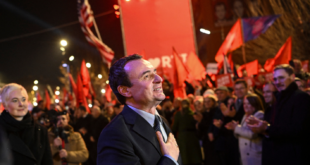President Boris Tadić said that Serbia’s foreign policy priorities are the EU, the country’s sovereignty, regional cooperation and economic diplomacy.
Tadić addressed the Ambassadors’ Conference in Belgrade on Tuesday and said that the success of Serbia’s foreign policies is an articulation of relations with big world powers such as Russia, America, and China.
He said that modern international relations are prone to changes, and that Serbia’s foreign policies must be flexible.
Tadić added that Serbia must work harder on cooperation with “political entities” for which there was “not enough time in the past”, especially improving relations with the BRIC group (Brazil, Russia, India, China) and countries of the Non-Aligned Movement.
The president said that as far as Europe is concerned, Serbia has achieve close relations and cooperation with Italy, France, Spain, Germany, Sweden, Greece, Slovakia, Hungary, among other countries.
“Still room for withdrawing lawsuits”
Tadić said at the same gathering today that Serbia had been obliged to file a counter-lawsuit against Croatia with The Hague-based International Court of Justice, but added, however, that there was still room for withdrawing the suits.
Tadić underlined that it would have been better had justice been sought in regular court proceedings than in a confrontation of the two countries.
“I am deeply convinced that that we have sufficient political and legal room for giving up on the lawsuit and the counter-lawsuit, and with such a position we want to avoid any confrontation of our countries, since that is not in the interest of any of us,” Tadić said while addressing the ambassadors.
The Serbian government reached the decision on filing the counter-suit on December 31 last year, following Tadić’s consultations with Prime Minister Mirko Cvetković.
Serbia decided to make the step because on July 2, 1999, Croatia launched proceedings before the ICJ against then Federal Republic of Yugoslavia (SRJ) over an alleged breach of the Convention on the Prevention and Punishment of the Crime of Genocide during armed clashes on the territory of that republic in the period between 1991 and 1995.
 Eurasia Press & News
Eurasia Press & News



